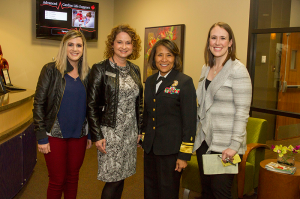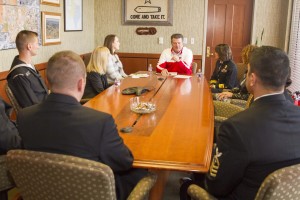Rear Adm. Raquel C. Bono (SOM ’83) visited the TTUHSC Lubbock campus in November. Visiting with her was a great experience, although initially nerve-racking. Walking into a room full of naval officers is a little intimidating — especially when you know you’ll be speaking with one of the most decorated women in the branch.I quickly learned there wasn’t anything to worry about. Bono is personable, loves her job and credits the Texas Tech University Health Sciences Center (TTUHSC) for attributing to her success.
The Beginning
Bono applied to multiple medical schools upon graduation from the University of Texas
in Austin in 1979. She chose TTUHSC because of the transparent service mission the
school displayed.
“I was attracted to TTUHSC initially because of the great sense of service and community,”
she said. “Then once I accepted and became a student I realized that I was getting
to be involved from the very beginning. The medical training TTUHSC was offering was
very pragmatic and unique at the time. I was in the clinics and getting my hands dirty
from the beginning, which I believe set me up with an excellent foundation in the
medical field.”
Bono joined the Navy as a medical student. She was on a health profession scholarship
program, which sponsored her throughout medical school if she applied to their training
programs and paid back every year of school with service to the Navy.
“When I got to the first fork in the road about whether or not I should stay in the
service or leave because I had fulfilled my obligated duty, I noticed a correlation
between health care and the military. Managed care was beginning to emerge in the
health care field all over the nation, which brought about many challenges for health
care professionals. I realized the military already had the infrastructure to make
managed care work, so I knew if I could learn a bit more about how they made managed
care work in the military, I could bring that knowledge and training to the health
care field if I ever decided to leave the Navy. Every time the decision came back
around to leave or stay, I realized that the service element of the Navy was what
made me stay, which is something I originally found at TTUHSC. Plus, I was having
way too much fun to leave!”
It’s in Her Blood
Bono is not the first of her family to be in the military or even the health care
arena. In fact, her brother is currently serving as a flag officer, as well, making
them the first Filipino siblings to serve side by side as rear admirals. However,
it all started with Bono’s grandfather, who wasn’t even a U.S. citizen at the time.
During World War II, the U.S. offered commissions to Filipinos if they wanted to join
the service, so her grandfather accepted.
“My grandfather was an OB-GYN by training, so what he would do is take care of his
patients during the day and then at night he would go into the field with the rest
of his company,” Bono said. “And he was not a combat surgeon in the military, he had
actually signed on as a line officer, so he was in the infantry, which was how he
became a prisoner of war. The neat part of his story is after the war in recognition
for his service to the military, he was granted fellowship training as an OB-GYN at
the old Walter Reed Army Medical Center. He was so enamored of his experience there
that he named his next son upon returning home Walter Reed. I’m now the director of
Walter Reed National Military Medical Center, so I guess his story has now gone full
circle.”
Bono’s father also served in the military, and they shared an experience together
that was truly unique.
“My father served in the Navy, as well, as a reserve medical core officer, and he
and I were deployed at the same time during the first Gulf War. I was on land at the
fleet hospital, and he was aboard the USNS Mercy. We had Army Black Hawk helicopter
pilots assigned to our hospital, and they needed to do their landing quads on the
Mercy so I hopped on the helicopter to have lunch with my dad that day.”
What it Takes
Bono has a very broad portfolio as a flag officer. Her primary job is to oversee
the health care market in the national capital region, which includes two hospitals:
Walter Reed National Military Medical Center and Fort Belvoir Community Hospital.
However, within her market, which has about 450,000 covered lives, she also oversees
nine outpatient military clinics and coordinates the care of patients between the
clinics and the two hospitals.
She also had a pretty extensive resume before she was instated as rear admiral. You
can read more about them in her official biography.
However, Bono would have never made it this far without her experiences from TTUHSC.
“My education from TTUHSC has influenced my career path on an everyday basis,” she
said. “Had it not been for what I learned at TTUHSC, I would never have established
the foundation to continue going through my medical career, as well as the element
of being able to serve others who are either underrepresented or had a need, which
is what attracted me to TTUHSC in the first place. That’s what I continued to develop
during my time at TTUHSC with every one of my patients. I saw that I could give back
and being able to take that to the Navy and, more importantly, for me to be able to
help the selection of people that will follow behind me that will also have the same
calling.
“I was on the admissions committee at TTUHSC, as well, and it was a very enlightening
experience. It made me more mindful of all the different domains that create a person
and how you want to evaluate that and how you can help select it. I took that experience
into my Navy career, too, when choosing people for naval residencies and internships.
And, most importantly, I learned from TTUHSC to strategically select people who will
fit with your overall mission and goals, which all centers around service.”

It was an enlightening hour and made me proud to work for an institution that turns
out incredible medical professionals like Rear Adm. Bono.
Kara Bishop
Sr. Editor
Pulse Magazine

